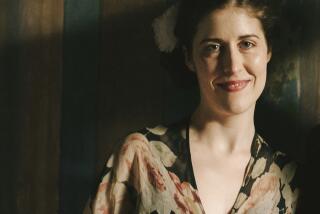Magic runs thin in a modern tale
- Share via
Ruby
A Novel
Francesca Lia Block and Carmen Staton
HarperCollins: 210 pp., $21.95
*
IT’S easy to sneer at novels relying on the principle of wish-fulfillment, but is there really anything wrong with stories that end happily ever after? Happy endings abound not only in charming fairy tales like Cinderella, but also in classic novels of all kinds, whether it’s Tom Jones winning the lovely Sophia Western or Jane Eyre and Rochester finding true love. Yet sometimes there may be reason to take a closer, more skeptical look at what may be behind such instant appeal.
Los Angeles-based writer Francesca Lia Block has made a name for herself with a stream of books (some for teenagers, some for adults) in which she serves up a heady brew mingling up-to-the-minute themes and settings with hefty lashings of magic, fantasy and fairy tale. She is clearly a writer who loves to write: to visualize, to imagine and to set it all down in pellucid, sensuous prose as irresistibly smooth and refreshing as ice cream.
In her latest book (classified as “adult” rather than “young adult,” though it seems equally suitable for either audience), Block has teamed up with a lesser-known writer, Carmen Staton, to give us the story of “Ruby,” a determined, magically gifted girl from the Midwest who not only triumphs over childhood abuse, but also lands the man of her dreams, a gorgeous yet sensitive British actor with the starry name of Orion.
Ruby is blessed with a strong imagination and uncanny intuitive powers: a good thing, considering the kind of ugly realities that are part of her family’s life. Although Ruby and her sister, Opal, have a loving mother who named them after jewels, Mom can’t protect them from Dad, an all-around bad egg who, in addition to preying on his daughters, is wantonly cruel to animals. The man is a monster: Ruby’s first memory is of watching him punch her sister in the face and making up her own mind at 3 years old that she, for one, will fight back.
Having survived into her teen years, plucky Ruby leaves home as soon as she can for a job as a nanny in Los Angeles. There she sees Orion Woolf’s fabulous face for the first time while viewing a DVD of the film that made him a star overnight. She does a little reading up on him, which convinces her that he’s the One: He loves horseback-riding, sky diving, sword fighting -- not to mention poetry -- and donates much of his money to environmental causes. “I thought, someone has to get you, right? Look at all the wives of famous, brilliant, beautiful men. They all had one thing in common, didn’t they? At one point, they all said to themselves, it might as well be me. They did what had to be done.” When she tells her employer she has to leave her job as nanny, the lady of the house is more than accommodating: “I understand, Ruby.... You’re meant to have whatever your heart desires. Did you know that? Whatever your heart wants that much is already a part of you.”
Off she goes to England to do what has to be done. She first befriends Orion’s parents, ideal in-laws for a young woman already into magic: Mr. Woolf is a renowned scholar who’s written on the suppression of witchcraft in the modern world, Mrs. Woolf keeps a shop called the Cauldron of Wisdom. You can tell they’re good people: kind to animals as well as sharing Ruby’s dietary preference for avoiding meat. Conveniently, Orion has been hurt in an accident and requires nursing back to health, which Ruby is on hand to provide.
Both Orion and Ruby have issues from their past needing to be dealt with, and in Ruby’s case, memories of Dad’s abusive behavior are especially painful. But one thing Ruby knows is that you don’t have to be bound by circumstances: You can make your own decisions to shape your life. This pretty much sums up the gist of what might be called this book’s “message,” surely an unobjectionable, perhaps even inspiring, sentiment.
But the crudely simplistic form in which this novel presents its lessons gives one pause. What we’re being shown is that merely wanting something will make it happen. As if by magic. And that to get what you want, you just go ahead and “do what has to be done.” What are the implications of this self-justifying little slogan? Cheat on an exam because you want to get into Harvard? Bribe a judge because you want him to decide in your favor? Bump off a witness slated to testify against you?
You’ve got to wonder just how much the creators of this determined little dynamo have thought through -- and beyond -- the vacuous mantras so blithely purveyed in these pages.
*
Merle Rubin is a critic whose work has appeared in several publications, including the Wall Street Journal and the Christian Science Monitor.
More to Read
Sign up for our Book Club newsletter
Get the latest news, events and more from the Los Angeles Times Book Club, and help us get L.A. reading and talking.
You may occasionally receive promotional content from the Los Angeles Times.








